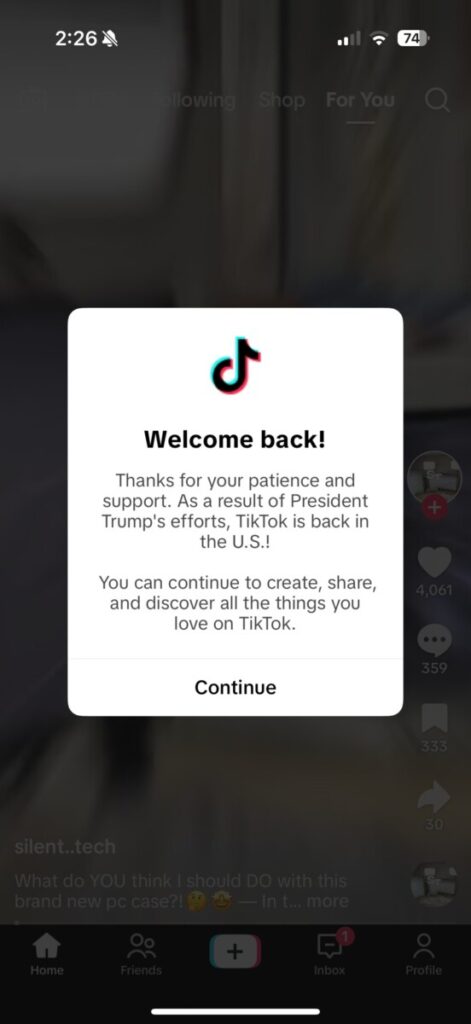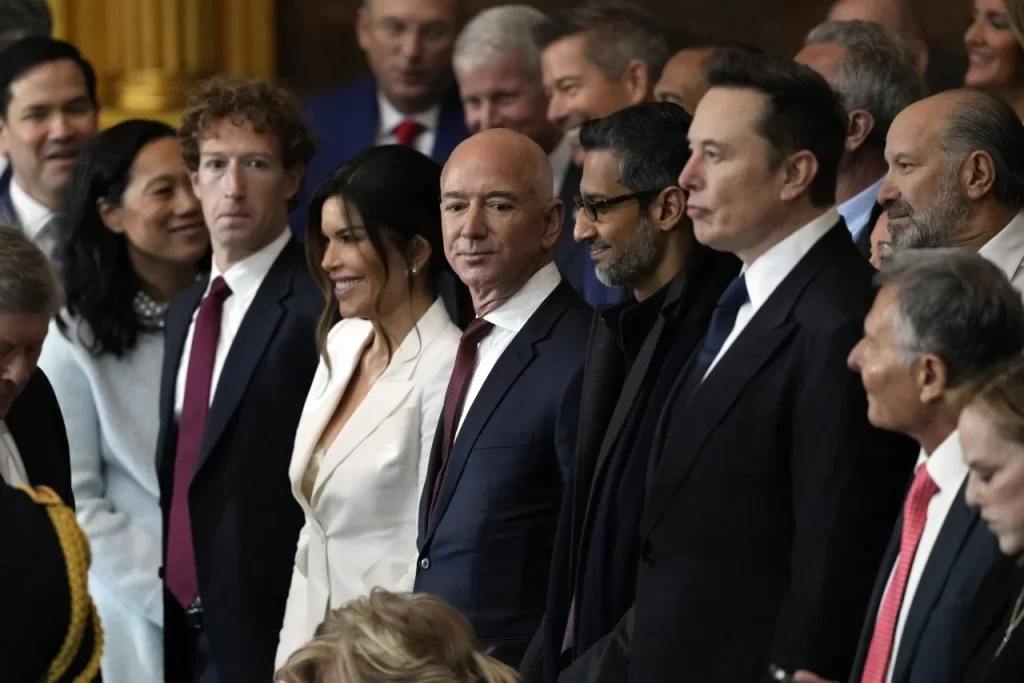Ryan Boulanger, Editor-in-Chief
@RyanBCourant
All opinions expressed on this page repre-sent the views of the author, not the views of the Courant. The Courant welcomes responses to this piece or on any other issue. If you’re interested in expressing your opinion please contact nchscourant@gmail.com.

hour hiatus. The app is no longer downloadable on the App Store.
“Welcome back! Thanks for your patience and support. As a result of President Trump’s efforts, TikTok is back in the U.S.!” Nearly 170 million American users of the uber-popular video-sharing app TikTok woke up to this message on the morning of January 19th. Less than 24 hours ahead of President Donald Trump’s inauguration ceremony, the promise to extend the grace period for the federal divest-or-ban order comes as a resounding power move.
Don’t get me wrong. The politics behind the divest-or-ban order are certainly worthy of their own examination. From what I understand the opposing argument is best articulated by our area representative Jim Himes: “As Ranking Member of the Intelligence Committee I have more insight than most into the online threats posed by our adversaries. But one of the key differences between us and those adversaries is the fact that they shut down newspapers, broadcast stations, and social media platforms. We do not. We trust our citizens to be worthy of their democracy,” Himes released in an official statement on his X account back in March of 2024.
Arkansas Senator and Chairman of the Senate Select Committee on Intelligence Tom Cotton, one of the leaders spearheading the ban since 2020, posted on his website on January 17th the following: “ByteDance and its Chinese Communist masters had nine months to sell TikTok before the Sunday deadline. The very fact that Communist China refuses to permit its sale reveals exactly what TikTok is: a communist spy app. The Supreme Court correctly rejected TikTok’s lies and propaganda masquerading as legal arguments.” Cotton’s rhetoric is unquestionably harsh, however there is a very substantive argument to be made on both sides of the issue. It’s quite the complicated predicament that has my head spinning to say the least.

However, the real root of the problem goes all the way back to 2020, during the closing months of the first Trump administration. In August of 2020, amidst the height of the COVID-19 pandemic, President Trump issued Executive Order 13943, titled: “Executive Order on Addressing the Threat Posed by TikTok”. The language used in the EO is quite targeted, outlining a very clear (to the president at the time) national security risk. EO 13943 best sums up this thesis with the sentence: “This data collection threatens to allow the Chinese Communist Party access to Americans’ personal and proprietary information — potentially allowing China to track the locations of Federal employees and contractors, build dossiers of personal information for blackmail, and conduct corporate espionage.” The aforementioned “data collection” is described in the preceding sentence as collected through user network information, browsing history, and even location; this seems to be much more in tune with Senator Cotton’s opinion on the subject.
Flash forward to June 1st of 2024, just a few months ahead of winning the Republican Party’s nomination for president, Trump joined the platform and amassed a staggering 3 million followers in a little over 2 short days. He pretty much immediately changed his tune on the issue, especially after swiftly surpassing opponent Joe Biden’s following of only 340,000. TrumpTok became a hit, with supporters across the country dancing enthusiastically to the song “Y.M.C.A” by The Village People, a favorite of Trump’s.
Now back to the current day. Trump swoops in, promises to reevaluate the ban, “saves” TikTok, and TikTok CEO Shou Zi Chew is sitting front row at his inauguration ceremony. It’s a tale as old as time. This ancient archetype is present throughout many of history’s most exclamatory hills and valleys: most notably recognized throughout the artificial scapegoats of our world’s political past. Whether it be the “explosion” of the USS Maine, America’s Red Scares, or (ironically) the violent Cultural Revolution of Mao Zedong’s China, the key elements are all locked into place. Through manipulation, deceit, and a toddler-like attitude Trump and his staff cleverly made us forget he ever switched his tune, and mailed his way straight to the loading screen of one of the internet’s most used social media platforms.
Just to be clear – I don’t perceive myself to be exaggerating the extent to which president Trump views himself as a savior of the multimedia platform, in fact the exact language utilized in the executive order he issued on day one of his presidency serves to best evidence this. In Executive Order 14034 Trump literally uses the word “save” to describe his actions: “…while saving a platform used by 170 million Americans.”

Perhaps even more frightening than the blatant beguiling of the situation, though, is the fact that three out of the four richest men on the planet by net worth (according to Forbes) were present at the president’s inauguration, and further yet, the total net worth of Trump’s cabinet picks so far totals a staggering $382.2 billion – which U.S. News and World Report estimates to be greater than the total GDP of 172 separate countries – not including tech billionaires Elon Musk and Vivek Ramamswamy, who were tapped upon to lead the quasi-government-agency known as the Department of Government Efficiency. Sure, it would be ignorant to suggest that billionaires don’t play an essential role in politics on both sides of the aisle, however, this presidency is on a scale the likes of which we’ve never seen before. Keep in mind that Trump’s ultra-wealthy cabinet is in charge of running the entire executive branch. These are the people who preside over essential daily operations such as making sure our packages arrive on time, our drinking water is clean, and ensure our safety in foreign conflicts. For a president who seems to invest lots of time and resources into eliminating the concept of DEI (Diversity, Equity, and Inclusion) hiring practices, he sure does love to pack his cabinet with extremely unqualified and particularly wealthy individuals (even more concerning, according to NPR trump tapped 19 former Fox News personalities to occupy his cabinet).
Why should we be concerned about this exactly? In 1976 the late president Jimmy Carter sold his humble peanut farm to avoid a conflict of interest with his presidential campaign. Trump, on the other hand, simply transferred the majority of his stake in the Trump organization to members of his own family. While the Constitution’s Emoluments Clause is a little shaky when it comes to the private financial dealings of the Commander-in-Chief, it’s also hard not to ignore the continually blurred distinction between the highest corners of opulence within corporate America and the office of what many consider to be a president elected on the populist ticket. To add to this blurred distinction, Trump and his team even launched the cryptocurrency $TRUMP just days before his inauguration, reaching a maximum market capitalization value of $15 billion according to Fortune. The Trump Organization currently owns 80% of shares, and while a complete rug-pull of the cryptocurrency is highly unlikely it still represents another major conflict of interest amidst promises to make America the “crypto capital of the planet”. Even if Trump himself has shifted ownership of the Trump organization over to members of his immediate family, his brand still bears an irrefutable connection to his personal image and prestige. For a lack of better words the guy makes his living slapping his name on things.
Considering his base consists of a majority white working class who have little in common with a billionaire real-estate developer, Trump’s earliest actions as president represent a growing oligarchical shift that President Biden warned about in his closing address. His mutual warming up to the corporate moguls and enticement of stunt crypto adventures is yet another manifestation of self-interest and blatant disregard for the common folk of our country.
Moreover, this ties back to the inherent concern I have with TikTok’s loading screen message. Unfortunately these actions are beginning to mirror some of the more draconian perspectives on American politics – that the key to political efficacy is to have friends in high places. Trump is certainly proving that to be true.
With a continual pushback from Republicans and Democrats alike in Congress TikTok’s future is still uncertain at best, but the main takeaway I would garner from this whole debacle is to be wary of demagogues posing as saviors. As a teenager myself I acknowledge that it’s impossible for our young and busy generation to constantly keep up with every unfolding incident across the globe, but it’s going to have to be a skill we work on in the coming months. Regardless of one’s political beliefs, values, and affiliations it’s very important to understand headlines in a larger frame. America’s going to have to read a lot of fine print for the next four years.




